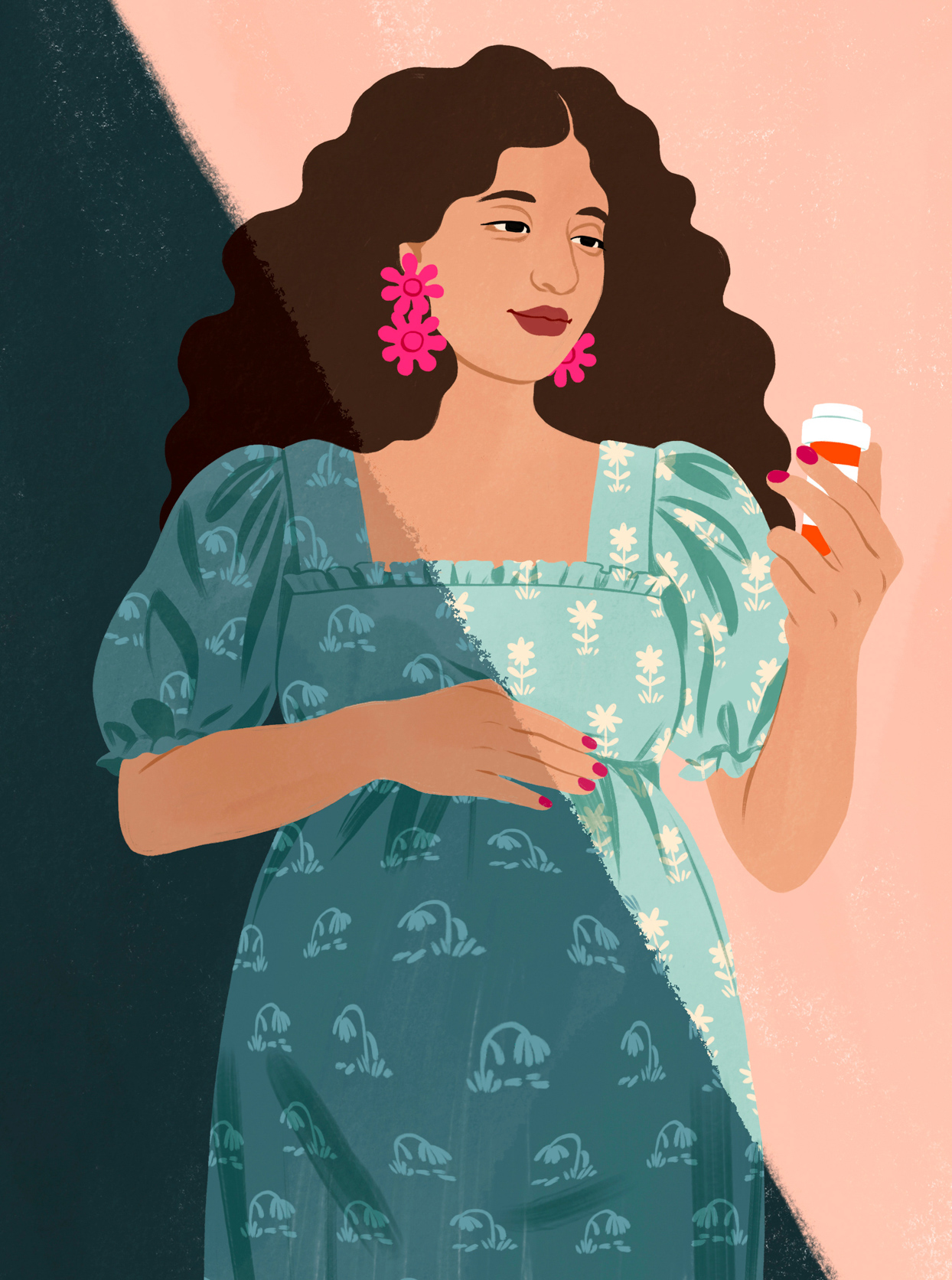
When Emily, a mom of three in Atlanta, became pregnant with her first daughter, she says her doctors acted as though "it was a given" that she would immediately stop taking the combination of Zoloft and Xanax she had used for years to manage her chronic depression and anxiety.
"When I asked whether I could keep taking them, they treated me like a heroin junkie or something," recalls Emily, now 28, who asked to use only her first name. "I did stop, but I was submitted to a drug test at every prenatal appointment even though I'd never used recreational drugs in my life. The message was, 'Be quiet, you're fine, think of the baby.' "
Emily didn't feel fine. She spent her pregnancy in a deep depressive state and in her final trimester began wrestling with suicidal thoughts. At the six-week checkup after giving birth to her daughter, Emily saw a different doctor, who recognized her symptoms as signs of severe postpartum depression. The doctor suggested Emily begin taking medication again, which she did.
But during her second pregnancy and when she became pregnant for a third time, in 2018, Emily decided to pause taking her prescribed medicine again.
"I didn't want the very accusatory questions at every appointment, so I just shut up," she says. "I thought, 'This is what pregnancy is like. Being this sad is the norm, and I just have to get through it, even though my anxiety is so high, it feels as if I'm trying to crawl out of my own skin.' "
Five months into Emily's third pregnancy, her dad died unexpectedly, an event she says solidified her need for help and her resolve to ask for it. Emily met with her doctor, who wrote a new prescription for Lexapro, a selective serotonin reuptake inhibitor (SSRI) used to treat anxiety and depression, which she had been taking with great success prior to getting pregnant. "It was such a relief to finally be heard—and to feel better."
A Shift for Doctors
"For too long, the attitude has been that medicating psychiatric illness during pregnancy is optional and even selfish," says Parents advisor Alexandra Sacks, M.D., a reproductive psychiatrist and author of What No One Tells You: A Guide to Your Emotions From Pregnancy to Motherhood. "We need to reframe this. Being proactive about your mental health is responsible, not selfish."
Psychiatric illnesses complicate an estimated 500,000 pregnancies each year, making them one of the most common health concerns facing moms-to-be. Nevertheless, prenatal health-care providers are often reluctant to write prescriptions for antidepressants, mood stabilizers, and other mental health medications because they frequently don't have enough data about how the medications can affect a developing fetus. Most FDA-approved drugs (not only antidepressants) for adults are, by extension, approved for those who are pregnant even though there is very little pregnancy-specific data available. For example, 90 percent of drugs approved since 2010 have no human data on pregnancy.
My obstetrician was saying, ‘You should talk to your psychiatrist about this,’ and my psychiatrist was saying, ‘Talk to your obstetrician.’
In many instances, doctors must rely on small case studies involving only a handful of patients or testing on animals. When guiding women in choosing medication during pregnancy, doctors often have to compare similar drugs, with data available for only one. Lexapro, for example, hasn't been studied for risk of birth defects, but no risk is associated with Celexa, a similar antidepressant, which has not been associated with birth defects in human studies, though some research shows that taking it during the third trimester may slightly increase a baby's risk for lung complications or cause mild withdrawal symptoms in the first few days of life.
The lack of safety data is a problem for drugs that treat any medical condition that persists into pregnancy, especially when uncertainties about safety lead to reluctance to treat medical conditions that may harm women and their babies. However, this is particularly true for untreated depression, which is associated with worse pregnancy outcomes, such as giving birth prematurely or the baby being too small at birth. Mental health conditions often worsen during pregnancy and in the postpartum months because of hormone fluctuations. In fact, as many as one in five women suffer from mood or anxiety disorders during pregnancy, regardless of whether they had them before. Research has also found that anxiety, depression, loneliness, and post-traumatic stress in pregnant and postpartum women have been significantly higher during the pandemic, underscoring the need for studies that will give doctors and women the information they need to make the informed choices about their mental health treatment in pregnancy.
A Legacy of Omission
"Pregnant women have largely been excluded from pharmaceutical research, even for medications they would benefit from and are likely to end up using anyway," says Anne Drapkin Lyerly, M.D., an ob-gyn and professor in the department of social medicine for the Center of Bioethics at The University of North Carolina at Chapel Hill. This is because clinical trial regulations passed in the 1970s prohibited women with "reproductive potential" from participating in early-phase clinical trials in order to avoid the possibility of birth defects—effectively stopping all drug research on women between the ages of 18 and 45. It wasn't until the early 1990s that researchers began to question that logic. "Female bodies are not just smaller male bodies, especially when they're pregnant," Dr. Lyerly explains. "Given the physiological differences, they process drugs differently too. So if you're going to prescribe medications for women, you should test them in women, rather than extrapolate from the data you've collected from men." In 1993, Congress passed legislation requiring drug researchers funded by the federal government to include women (as well as people of color) in clinical trials, unless they could prove that the medication would have no applications for women's health (such as a drug to treat prostate cancer).
"But pregnant women were still largely left out of the equation. For one thing, they were considered a vulnerable population along with children, prisoners, and people with intellectual disabilities. This had a chilling effect on research because there was fear that it was unethical to include pregnant women in clinical trials," Dr. Lyerly says. This has left "pregnant women with the terrible choice of using a medication that may be dangerous or ineffective, or not using it and exposing themselves and their fetus to the risks of their disease."
Dr. Lyerly disagrees with the notion that "ethics" is what keeps pregnant women out of drug trials: "In fact, ethics demands that we do this research because without it, we don't know whether drugs are safe or even dosed correctly," she explains, emphasizing that "pregnant women deserve care that is based on evidence, and access to medications and treatments that will optimize their health as well as the health of their baby."
Caroline, a mom of two in Clinton, South Carolina, who had a psychotic break and was diagnosed as bipolar a year before becoming pregnant with her now 10-year-old, remembers the conflicting direction she received while pregnant. "My obstetrician was saying, 'You should talk to your psychiatrist about this,' and my psychiatrist was saying, 'Talk to your obstetrician.' They kept kicking it back and forth, and neither one would say what I should do." Ultimately, Caroline (a pseudonym) decided to stay on both the antidepressant Prozac and the antipsychotic medication Abilify for her first two trimesters. She then weaned off during her third trimester and for the year that she breastfed because she was concerned that the drugs could pass through breast milk, though there is little data available about this. "My mom stayed with us, and then we hired baby nurses, because a lack of sleep can trigger my episodes," Caroline says. "We got through it, but I was very aware that whole year of how dangerous it could be. When I had been psychotic the year before, I wasn't safe for myself and certainly not for a baby."

In 2016, Congress passed the 21st Century Cures Act, which established a task force devoted to improving the state of research specific to pregnant and lactating women. Several research centers have set up medication registries. For example, The Ammon-Pinizzotto Center for Women's Mental Health at Massachusetts General Hospital runs the National Pregnancy Registry for Psychiatric Medications, which collects data on women who used antidepressants, ADHD medications, and atypical antipsychotics during pregnancy and is currently conducting studies on treatments for postpartum psychosis, a severe form of postpartum depression. These registries help scientists collect data on how drugs may affect pregnancies, which can help inform the safest prescribing guidelines both during and after pregnancy.
Most of the data collected in these registries are what scientists call retrospective—for example, a report from a woman who shares, after she's had her baby, the medications she used while pregnant and the outcome of her pregnancy. Retrospective studies, however, have their limitations and are not considered the gold standard of drug research. They can't always control confounding factors that may contribute to the risk that researchers are trying to assess, such as a subject's depression history, genetics, or smoking and drinking habits. "These factors can blur the results of a study," notes Dr. Sacks, who hosts the podcast Motherhood Sessions. "We also don't necessarily know whether the risks are because of the antidepressant or because of the impact of depression itself." Gathering new data is an important step toward finding more answers. (The website WomensMentalHealth.org provides information about new research and offers mental health resources for patients and doctors.)
Weighing the Risks
Suicidal ideation, as Emily, the mom of three, experienced, is one of the worst-case scenarios of what can happen when a pregnant woman's mental health condition goes unmanaged. But research shows that a poor mental state can affect pregnancy in other significant ways too.
Louisa, a mom of two boys in Poughkeepsie, New York, who also asked to change her name, manages her depression, anxiety, and bipolar disorder with a combination of Celexa and Latuda, an antipsychotic most often used to treat depressive episodes associated with bipolar disorder and schizophrenia. "I finally felt like a normal person," she says of starting the medications after years of struggling with "rage spirals." "My work, my relationships, everything got better. It was the first time I could remember not feeling so angry and anxious all of the time."
When Louisa and her husband decided to start trying to get pregnant, her doctor advised her to stay on Celexa. But Louisa's doctor did advise her to wean off Latuda, because there haven't been adequate and well-controlled studies in pregnant women, and similar drugs have been associated with respiratory distress and other complications in newborns.
Louisa conceived her first pregnancy quickly at age 32 but miscarried at 13 weeks. "My mental state was not good after that," she recalls. She went back on Latuda to help her cope with the loss and stress of trying again. But when she got pregnant a few months later, she stopped taking Latuda and continued on just Celexa. "Every time, it was a huge conversation," Louisa says. "I was nervous about even staying on Celexa, but I also knew the dangers of my rage attacks." Both her boys were born healthy, and she resumed her usual medication regimen after breastfeeding.
Women with bipolar disorder do have a higher risk for pregnancy complications and birth defects than the general population when taking medication, but discontinuing medication can significantly increase the likelihood of a relapse, according to a 2017 review of 20 studies published in the Journal of Midwifery & Women's Health. Another study found that women with depression who stopped medication were five times as likely to experience a relapse during pregnancy as women who continued with their prescriptions.
Mothers should feel good before, during, and after their pregnancy.
"If you're suffering from a mood or anxiety disorder or another psychiatric condition, you may need to take medication during pregnancy because the benefits of treatment for you and your baby may outweigh potential relative risks," Dr. Sacks says. "This is true for psychiatric conditions just as it's true for medical ones like high blood pressure." Untreated anxiety or depression can also send high levels of cortisol and adrenaline through the body, which may increase the risk of low birth weight, preterm labor, gestational hypertension, and even miscarriage, explains Jennifer Adaeze Okwerekwu, M.D., a reproductive psychiatrist based in Boston. A baby's social and emotional development may suffer as well if their new parent suffers from depression. If a baby coos, for example, and their mom doesn't have the mental energy to coo back, it can delay the baby's language development.
Mothers should feel good before, during, and after their pregnancy, says Dr. Okwerekwu. "Children of mentally healthy mothers have better mental, emotional, and behavioral health than those of depressed moms, whether exposed to antidepressants or not."
As for potential long-term impacts to a child, current accumulated research does not suggest a link between fetal exposure to SSRIs and an enhanced risk for ADHD or autism. "Because mothers' mental illness can get in the way of the social and communication skills that babies learn from their caregivers, taking an SSRI to get you to a better place may protect these precious. opportunities for brain development," Dr. Okwerekwu points out.
Still, more research is needed to understand the long-term impacts of a range of mental health drugs. Some retrospective research suggests that certain medications, such as Ativan or Xanax, which are antianxiety medications called benzodiazepines, may slightly increase the risk of birth defects like a cleft lip or palate. But early studies suggest that this risk appears to be relatively small—about 0.7 percent—and a more recent study suggests that the risk may be even lower than that number.
“You Could Enjoy This Pregnancy”
Jessica Phillips, 34, of New Orleans, admits she worked hard to manage her generalized anxiety disorder without medication for years before becoming pregnant. "I met with a therapist to learn lots of coping mechanisms and also made changes to my diet and exercise that really helped," she says. But during the first trimester of her first pregnancy, her anxiety spiked in ways she wasn't prepared for. "I was terrified to drive on the highway in case I'd get in a car accident, and I woke up every morning afraid I'd lose the baby," she says. "Pregnancy is supposed to be so joyous, and this was quickly becoming the worst time in my life." She saw her obstetrician at 13 weeks and explained how she felt, expecting to be told to try harder with her diet or sleep habits. "Instead, she looked at me and said, 'You know, it doesn't have to be this way. You could enjoy this pregnancy,' " says Phillips, whose doctor then recommended the use of an antianxiety medication.
Her doctor explained that having high anxiety during pregnancy is a risk factor for postpartum anxiety and depression. In one study, Turkish researchers followed 73 women with depression during and after pregnancy and found that those who treated their depression during pregnancy did not report postpartum depression. However, 92 percent of the untreated women continued to struggle in the months after their baby was born.
"It's a false paradigm to say you can separate the needs of mother and baby," Dr. Sacks says. "We need to prioritize the mother's health for her sake in order to ensure a healthy pregnancy." Phillips agrees: "My doctor told me, 'This isn't something you can manage by yourself, and if we don't treat you, it will affect how you bond with your baby and your memories of this time.'" Phillips, who since the time of the interview has had a second child and was medicated during that pregnancy and postpartum, says a combination of medication and therapeutic coping strategies greatly reduced her symptoms. "I enjoyed these pregnancies. And it's because I felt in control of how we managed my mental health during them."
Improving Health (and the Science)
"The best way to have a healthy baby is to stay healthy yourself—and that may involve taking a medication," says Dr. Anne Drapkin Lyerly, of The University of North Carolina at Chapel Hill. If you use medication to manage a chronic mental health condition, women's health experts recommend talking with all of your doctors (your ob-gyn in partnership with your psychiatrist) about whether to taper your dose or change medications before becoming pregnant. "Switching medications can cause relapses or flare-ups, and ideally you want your symptoms well managed before you get pregnant," explains Sonja Rasmussen, M.D., a clinical geneticist at the University of Florida, in Gainesville.
But if you become pregnant unexpectedly or develop worsening symptoms while pregnant, you should have an in-depth conversation with your provider about potential risks of your medication and weigh that with the risks of no treatment. If your provider is unsure, ask for a referral to a reproductive psychiatrist or a maternal fetal-medicine specialist, who may be available for a virtual consultation. You can also look up fact sheets on the safety of specific drugs during pregnancy at MotherToBaby.org, a website run by the Organization of Teratology Information Specialists.
"However imperfect, the safety research has been expanding, especially on psychiatric medications," says reproductive psychiatrist Dr. Alexandra Sacks. In 2015, the FDA began requiring drug manufacturers to redo prescription inserts for all drugs (including generic) so that they offer more detailed explanations about the potential risks of a medication during pregnancy and lactation. (These descriptions replaced an earlier labeling system that categorized prescription drugs as A, B, C, D, and X based on available data—usually animal studies—but that critics said didn't do enough to help women put the risks into context.) Advocates hope that the new labels are helping doctors and patients make more-informed decisions, although they say there is still room for improvement.
This article originally appeared in Parents magazine's December 2021 issue as "Speaking Up About Depression in Pregnancy." Want more from the magazine? Sign up for a monthly print subscription here
Parents magazine
































